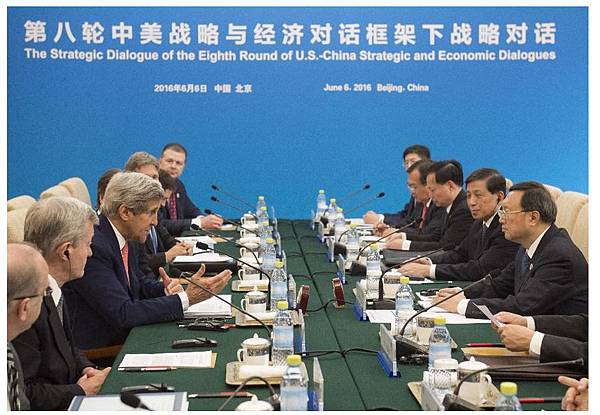Why Odds Of War In The Contested South China Sea Are Near Zero
Ralph Jennings, Forbes, June 6, 2016
accessed June 6, 2016
2004年我開始說"不戰而主東亞"是北京的大戰略。之後,我多次表達淺見:"進入廿一世紀後,主要國家之間的戰爭打不起來"。現在這看法開始進入西方觀察家的視野。
林中斌 2016.6.17
"But the United States, China and other Asian countries with maritime claims depend on one another too much economically to get into an armed struggle, says Lin Chong-pin, a retired strategic studies professor in Taiwan. Interdependence has surged since the Global Financial Crisis seven years ago, he says. China, he adds, since 1982 has advocated struggle without a reaching a breaking point."

If you live in Taiwan, you know how this works: Show up in a café or a library and find the tables occupied not by people but their stuff. Books and a water bottle, even a laptop computer, tell you “don’t sit here, it’s occupied.” Owners of the stuff aren’t in the toilet. They’re in a class or out shopping. Seat seekers usually oblige the hint even though it’s a slap in the face, or maybe just a forgettable nip.
This metaphor happens to apply to the South China Sea, a tropical Asian body of water contested by seven governments, including an expansionist China and others backed by Beijing’s rival world superpower the United States. Taiwan is a claimant as well. Despite speculation about armed conflict as China bores deep into other countries’ maritime territory, the parties have learned during their dispute of more than 40 years to avoid one another’s stuff yet keep saying in public that it’s all theirs and please everyone else stay away.
US Secretary of State John Kerry (L) speaks during a session on across from Chinese State Councilor Yang Jiechi (R) during a Strategic Track small session as part of the US – China Strategic and Economic Dialogues at Diaoyutai State Guesthouse in Beijing on June 6, 2016. President Xi Jinping said China and the US needed to trust each other more as both sides sought to minimise tensions over the South China Sea at the opening Monday of key annual talks in Beijing. (SAUL LOEB/AFP/Getty Images)
China, for example, disagrees that Malaysia has a territorial right to explore for undersea natural gas around the Spratly Islands, but it doesn’t sabotage the equipment. Vietnam and Taiwan claim islets elsewhere in the Spratlys, one archipelago in the 3.5 million-square-meter ocean, that are so close you can see from one to the next. But they don’t attack and Taiwan says it has even helped Vietnamese vessels – erstwhile maritime intruders per Taiwanese law – recover from storm damage. The two governments still occasionally point fingers for infringing on each other’s maritime claims to parts of the ocean that’s packed with fish and undersea fuels.
Armed conflict would follow only if a claimant took the books and laptop off someone’s metaphorical library table and there’s little precedent. “I only think there would be a war if Vietnam or the Philippines tried retaking territory already seized by Beijing,” says Sean King, senior vice president with consulting firm Park Strategies in New York. “I think a de facto code of conduct is evolving, most easily shaped by Beijing.”
Fear of conflict has obvious merit. Vietnam fired on two Chinese ships in 1974 and in 1988 China killed 74 Vietnamese sailors as it sank or demolished three ships. Two years ago Chinese and Vietnamese boats sparred after Beijing allowed a Chinese state oil company to park a rig off Vietnam’s coast. China’s militarization of some of the sea’s approximately 500 islets among the various archipelagos raises more concern, prompting weaker claimants such as the Philippines to seek help from the United States or start buying more weapons.
But those upsets are oddball incidents, nothing near routine. No one wants a war despite the maddening erosion of their claims and the economic opportunity they represent. First, the countries claiming the South China Sea have been leaving their stuff there a long time and coast guards from other places know where it is, reducing odds of a mishap. China and the United States both move in “predictable” ways and military commanders from each side have probably ordered no shooting except in “extreme” cases, says Denny Roy, senior fellow with the East-West Center think tank in Honolulu. The idea is the United States could strike on behalf of its old colony the Philippines as the two sides have increased defense cooperation since 2014.
But the United States, China and other Asian countries with maritime claims depend on one another too much economically to get into an armed struggle, says Lin Chong-pin, a retired strategic studies professor in Taiwan. Interdependence has surged since the Global Financial Crisis seven years ago, he says. China, he adds, since 1982 has advocated struggle without a reaching a breaking point. “The unprecedented magnitude of interdependence of powers in the world and especially after the great recession 2009 is such that they wouldn’t want a war,” Lin says.


 留言列表
留言列表


